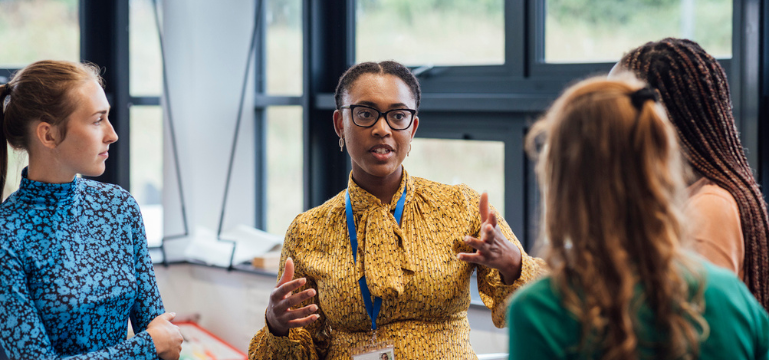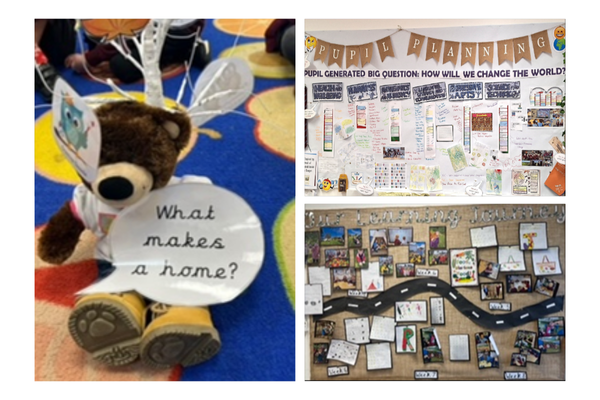Whole school approach to self-evaluation

Quick links:
Information about the school
Evenlode Primary School is a two-form entry school for pupils from Nursery to Year 6. The school has capacity for 510 pupils (nursery has a capacity for 96 part time places and three intakes per year). 2% of pupils are eligible for free school meals, 5% have English as an additional language and 3% have additional learning needs (ALN). The school has a culture of reflection that underpins its vision and values.
Evenlode Vision
‘Evenlode Primary School is a community of belonging. We are committed to inspire all individuals to thrive and flourish through our rich learning experiences. Every child is valued within our inclusive, vibrant and nurturing school.’
Values:
The school’s values are underpinned by the four purposes:
- As ethical informed citizens, we are respectful and compassionate
- As enterprising, creative contributors, we are determined and able to think ‘outside the box’
- As ambitious, capable learners, we are resilient and inquisitive
- As healthy and confident individuals, we are positive and kind
Motto:
Belong, Believe, Achieve.
Context and background to the effective or innovative practice
The reflective culture or ‘constant feedback loop’ is embedded in all aspects of the culture at Evenlode Primary School. Recent changes to the school’s context, including amalgamation with the local nursery, changes in leadership, the implementation of new curriculum and assessment processes, presented a unique opportunity to review strategic processes. The school has ensured that ongoing reflection of its ethos and values, pedagogy, curriculum and self-evaluation processes are central to its work and improvement.
Description of nature of strategy or activity
Community: Parents’ Forum
A Parents’ Forum was set up in Spring 2023, in response to an identified need to develop stronger partnerships and communication between the school and parents. Each year group is represented at half termly meetings, where senior leaders and the Vice Chair of Governors meet to discuss aspects of the school’s work that parents would like to know more about. At these meetings, parents can raise any queries. This forum creates an effective feedback loop from parents to leaders and governors and leads to changes in school life.
Community: Anti- Racism action research.
The school was involved in the first Anti- Racist action research in the Vale of Glamorgan LA. Staff reflected personally and professionally on the school’s values, ethos and curriculum during its work to develop as an anti-racist school. Staff were given time to research key ideas using a ‘think, pair, share’ approach: spending time reflecting individually, in year groups and as a whole staff community. As a result, the school refined its vision, made changes to its humanities curriculum and the resources, including books used to support learning. In addition, the school was involved in two arts projects exploring themes of celebration, identity and belonging through dance. Plans are in place to further develop this work by involving parents and governors.
Reflective professionals
During a three-year period, the headteacher led the implementation of a bespoke curriculum and new assessment processes. As part of this implementation and to ensure that the work had a positive impact on learning, leaders and teachers met half termly to reflect on practice and outcomes. These meetings focus on robust and honest professional dialogue about the impact of pedagogy and curriculum strategies: what is working well and what needs to change? The evaluations feed into the cycle of school improvement review and adaptations to priorities are made when necessary. For example, the school made changes to the teaching as a direct result of professional dialogue in these meetings. The school also uses coaching to enable teachers to reflect on their own practice is a focus.
Reflective learners
With the four purposes underpinning how the Evenlode curriculum is designed and constructed, one of the school’s key priorities is to ensure pupils reflect thoughtfully on the world around them, enabling them to be ethically informed citizens. The school has implemented philosophical enquiry as a whole school approach. Through this philosophical approach, pupils explore big ideas and concepts through ‘big questions’ and design their own enquiry questions for learning. Pupils develop as effective critical, collaborative, creative and caring learners.
The school’s ‘Hook, Book and Big Question’ curriculum, provides useful opportunities for pupils to influence their learning. Pupils select aspects of learning they would like to learn more about, have frequent opportunities to reflect on their learning, and add to their own planning boards in the classroom. Older pupils complete learning logs: reflections on their own learning, choosing how to record this information.
What impact has this work had on provision and learning?
The school’s partnership with parents includes hosting workshops that support them to understand the school’s curriculum and assessment arrangements. Leaders involve other agencies and organisations, for example to provide information on ALN support, neurodiversity and pupils’ use of smartphones. Future workshops will include Cymraeg 2050.
The school’s curriculum has been strengthened through the anti-racism action research and philosophical enquiry approach, with pupils having experience of a diverse range of perspectives. Pupils engage well with their learning and enjoy taking ownership of their progress. Pupils’ make their views clear, for example, respond to their learning: ‘‘it challenges you and engages you and you build on other people’s ideas’, ‘We find out about other people’s opinions during the sessions and keep an open mind’, ‘It links our learning in different ways’. Through a focus on opportunities for pupils to reflect on and direct their own learning, they demonstrate engagement and curiosity as well as retaining and demonstrating a depth of knowledge, skills and understanding.
Staff develop a common language and understanding of effective pedagogy and assessment, and this leads to strong progress over time for pupils. Teachers feel that the school’s approach enables them to ‘look at things with a different lens’ and find this a powerful to review, refine and adapt approaches to teaching and learning.
How have you shared your good practice?
The school has shared its curriculum work with other schools through cluster meetings and during training. Senior leaders have presented the impact of the school’s anti-racism work with senior leaders in other schools and shared examples of reflective practice with the local Authority.
